HENRY ANDREW MICKLEM
Colonel Henry Micklem (sometimes mis-spelt Micklam) served on the Board of the Great Southern of Spain Railway from 1914 to the companys demise in 1951. He was its longest-serving Board member (p.147 in my book). I knew little about him when I wrote the book other than that he appeared to have served in WW1. In fact it turns out that he had a long and distinguished military career, followed by an equally interesting civilian one.
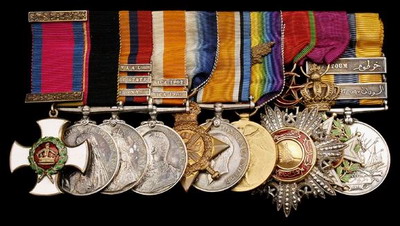
I am indebted to David Biggins for permission to use information on Col. Micklem from his Boer War web site.
Please note that Mr Biggins retains the copyright on this information.
Quotations are given in red and references are underlined. Click on the references to see more information.
Military Career
* * *
Henry Andrew Micklem was born at Farnborough on 29 June 1872, the eldest son of Major General Edward Micklem and Eva, daughter of T M Weguelin, MP. He was educated at Winchester College, and joined the Royal Engineers on 1 August 1891, becoming a Lieutenant on 1 August 1894. He was employed with the Egyptian Army from 25 June 1897 to 3 October 1899, and served in the Nile Expedition of 1897 , for which he was awarded the Egyptian Medal1. In the Nile Expedition of 1898 he was slightly wounded at the Battle of Khartoum; was mentioned in Despatches [London Gazette, 30 September 1898]; received the Fourth Class Medjidie Medal 2, and a clasp to the Egyptian Medal. He was also created a Companion of the Distinguished Service Order [London Gazette, 15 November 1898]3,4. He served in the South African (Boer) War from 1 January 1900 to 30 June 1902. He was severely wounded; was mentioned in Despatches [London Gazette, 10 September 1901]; was given the Brevet 5 of Major, 2 August 1902; received the Queen's Medal6 with three clasps, and the King's Medal with two clasps. He was employed on the Central South African Railways 7 1 July to 1902 to 18 April 1903, and employed under the Chinese Mining and Engineering Company8 16 June 1904. He retired from the Royal Engineers 2 June 1909. He served in the European War from 1914 to 1918; was Major, Reserve of Officers, 27 August 1918; was given the Brevet of Lieutenant Colonel; created a CMG9 in 1918, and a CBE in 1919. He died in March 1963.
* * *
Civilian Career
He was on the board of at least three investment trusts: The Alliance Investment Trust, The Army and Navy Investment Trust, The Bankers Investment Trust and The Starting Trust.
Here are some other companies (there may have been more) in which he held a directorship.
The Gaumont British Picture Co. Ltd.
This company was formed in 1927. A laconic comment in a 1937 report called "Money behind the screen," notes that the next five companies below (all of which had HAM as a director) held considerable blocks of preference shares in this company. I have no evidence that any of these companies invested in the GSSR,(which by 1937 had already been seized in the Civil War). The report continues later that the financial arrangements of the GBP were so complex that it was almost impossible to ascertain its true situation. A noisy shareholder's meeting in 1936 had failed to force the board to clarify matters.
Greenwood and Batley
Unlike the four above, this was an engineering company. My primary interest is in Col. Micklem so I have only written a skeleton outline of the company. There is a lot of information on the Internet, particularly about their railway work. Many preserved lines have G & B engines and equipment in their stocklist. A history of the company appears on Wikepedia.
The Colonel was associated with the company between 1932 to 1962, when he retired aged 89 or 90. He died a year later. The Gaumont report above notes that he was Chairman in 1937.
Thomas Greenwood and John Batley opened for business in 1856 in Leeds. They rapidly became a large company, manufacturing a huge range of products. By the turn of the 20th century Greenwood & Batley offered the following products:-
Machine Tools, Oil Mill, Printing and Sewing, Electrical, Textile, and Special Machinery, Industrial and Railway engines, Ordnance (including some of the first tanks in the First World War) and locomotives, particularly electric engines.
Today there is no tangible evidence of this establishment. In 1987 the site was sold and the works demolished. The only local reminder of the Albion Works is the name of the public house The Albion.
The Zafra and Huelva Railway
This railway is mentioned briefly in my book (page IX) as another Spanish Gauge line constructed by British interests. It was founded in 1881 when a concession was obtained to construct and develop a line of 180 kms linking Zafra to Huelva in south east Spain. The company was established in 1884 and work began the same year. Like the GSSR, its objects were connected with mining. Unlike the GSSR it was not siezed in the Civil war and kept going until 1941 when it was taken over by RENFE. You can find information on the line on Wickipedia.South Crofty Ltd
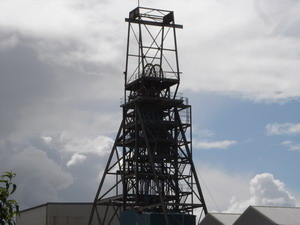
This company was established in 1906 to mine tin, near Redruth in Cornwall. I recently visited the site of the mine, and also the Cornwall Records Office in Truro. {It was formed in 1906 and eventually closed in 1998.} Micklem was a director from 1911 to 1919, so he joined their Board a couple of years after leaving the Royal Engineers.
I only have a passing interest in South Crofty per se, but I did note that the fortunes of the company, unsurprisingly, followed that of the price of tin. In 1914, no dividend was paid due to A heavy fall in the price of tin. This of course, referred to 1913, but the next year, due to WW1, prices had risen again. In 1917 Crofty invested in 5% War loan stock. The mine still exists and now that the price of tin has risen so much there are moves afoot to re-open it. You can find out more on this site. A recent television programme (Three men in more than one boat) showed the actor and presenter Griff Rhys Jones visiting the mines. They are building an underground road which will be 7 miles long and will carry the latest mining equipment.
But what of the Colonels role? He was certainly a regular attendee at its Board meetings. His name appears on almost every directors meeting up to 1919. The meetings were held in Broad Street London, then at Winchester House. If these addresses sound familiar, its because they were also where the GSSR Board met! Perhaps its not such a coincidence, though; these places probably just contained conference rooms that could be hired for the day.
The annual reports refer to Micklem by rank, so his rise to full Colonel is recorded there, which raises a mystery. The minutes refer to him as Major to start with, then Lt-Col in June 1916 and Col in July 1917. This is in conflict with the dates given above for his military history.
Another interesting point. He regularly attended both directors and general meetings during WW1, as he did for many GSSR meetings (although there is that one reference to being on active service). He may well have been attending others. He would have been 42 at the start of WW1, probably a little old for active service, of which he had seen plenty. His injuries may also have been a problem. It therefore seems likely that he saw out the war out in London on the War Office staff there, perhaps advising on transport matters, particularly railways.
Col Micklems time on the South Crofty Board ended in acrimony. He had a disagreement with the other directors about dividends in 1918, but things came to a head a year later regarding investment of funds. Micklem wanted money to be put into Cornish concerns, but others, particularly one H J Meyerstein wanted investment abroad. The Chairman Mr Frances Allan JP decided to put it to the shareholders. Below is an edited extract of the minutes of the 1919 AGM regarding this matter.
* * *
The Chairman said they now came to a resolution which he might call the commencement of a controversial matter. When the question {of investment} came before the board Mr. Meyerstein had been asked by shareholders whom they looked upon as serious men of business whether it would not be wise, instead of going into further business of the Castle-an-Dinas nature, to spread their interest into other countries. Colonel Micklem did not see his way to fall in with that view, and, in fact, strongly objected to it. Accordingly, he, the chairman, suggested that it should be left to the shareholders to decide, with a view to avoiding anything like a public controversy. In the circular he had frankly asked the shareholders to choose between Mr. Meyerstein and himself and Colonel Micklem. They had not been in harmony on the board. He and Mr. Meyerstein had been left to do the bulk of the work and had frequently visited the mine, whereas Colonel Micklem in the eight years he had been a director had been there only about twice. He concluded by proposing : " That the directors be authorised to acquire and work or take an interest in any mining undertaking in any part of the world."
Mr. H. J. Meyerstein seconded the resolution.
Colonel Micklem, who spoke amid frequent interruptions, said it had. been his policy to build up a reserve additional to the necessary working capital to give them about £25,000 in liquid assets to meet adverse mining conditions. This was gradually effected in face of the opposition of Mr. Meyerstein, and there was no doubt this policy contributed enormously to the strength and success of the company. The purchase of Castle-an-Dinas reduced the liquid assets of the reserve by £11,000. He would not have agreed to this had he not clearly understood that the board were agreed as to the necessity of gradually renewing the reserve. The purchase of Castle-an-Dinas had not reduced the need of a liquid reserve, since it had increased their operations, and it was his opinion that it was necessary in the interests of the company to gradually reinstate the liquid reserves. He denied that he had offered constant opposition to the payment of a fully-justified interim dividend. Subject to the position justifying it, he had never, and did not now, oppose the payment of interim dividends; but he did oppose wide variations made in those dividends without good cause. The vital issue before the meeting was whether the company should acquire and work mining undertakings abroad. The company was formed for the express purpose of working a particular mine in Cornwall. The staff, including their highly qualified manager, was the staff required to carry on their operations in Cornwall, and no more. Were the working capital and reserve, weakened already by the purchase of Castle-an-Dinas, to be withdrawn from South Crofty just at the time when, owing to the uncertain general outlook, the importance of being well supplied with funds was at its greatest? Was their manager to be withdrawn from the mine, the business of which he had managed so successfully, at the time his presence was most needed? Both courses were disastrous to South Crofty.
The Chairman said that proxies had been received as follows : On Colonel Micklem's side, 59 shareholders, holding 24.845 shares; and on the other side, 288 shareholders, holding 116,184 shares.
Mr. H. J. Meyerstein denied that he had ever objected to building up the reserve. In fact, the reserve was started before Colonel Micklem joined the board.
Mr. Brown said there was only one point before the meeting, and that was whether they should give power to the directors, if they thought fit, to take up interests abroad. This they ought to do. He moved that the resolution be put.
Mr. Denton said he had given notice of his intention to move that Mr. Henry Lovegrove be appointed as a director. He was a man of the highest integrity and business capacity, and would do good work for the company.
The resolution was then put to the meeting and was carried, 33 voting for and Colonel Micklem against.
Colonel Micklem demanded a poll, but subsequently withdrew his demand.
Mr. Denton then proposed the appointment of Mr. Lovegrove, and it was seconded by Mr. Smith.
In answer to a question, the Chairman said this would increase the number on the board by one. He thought if Colonel Micklem was a sportsman he would retire from the board.
The resolution was then put and carried.
Colonel Micklem, amid much opposition and many hostile cries, declared that the resolution to take up interests abroad was ultra vires, and there was some disorder.
The Chairman pointed out that they had already the powers under the articles to take up interests abroad.
Mr. Elder then moved : "That Colonel Micklem be requested to retire, and that failing his doing so it be an instruction to the board to convene an extraordinary general meeting to remove him."
Mr. S. Deacon seconded this, and it was carried with one dissentient.
* * *
Well, of course, Col Micklem was a gentlemen and one month later on 14th May 1919, his resignation letter was accepted. I assume he had shares in the company, did he sell them?
I looked up 9 Green Street on the web and it happened that Flat 1, 9 Green Street was for sale - a snip at just under £2,000,000!
Odds and ends
There is an entry for Col Micklem in "Who was Who". It doesn't add a great deal except that he does not appear ever to have married. He was a member of the Carlton and the Army and Navy Clubs. He had two addresses, one at 9 Green Street, Mayfair and the other at Rosehill, Henley on Thames. This latter address was his father's home. There is a date error in another book, "Who's Who in Berkshire" giving the start of the Boer war as 1891 instead of 1899.However, this book agrees with David Biggin's page suggesting that the CBE should in fact be the CB.In the 20s he did some travelling by ship, visiting Madeira and Las Palmas. His address then is given as 7 King St, St.James, London. An entry in the Royal Corps of Engineers in about 1903 shows him as in South Africa as "Superintendent of Railway Works". A person whose father was head gardener and who grew up on the Rosehill estate recalls that the "big house" only had well water and its own electricity generator. The estate cottages had no electricity at all. This person confirmed that the colonel never married and that he only spent the weekends at Rosehill, weekdays he was in London. The colonel was, shall we say, careful with his money! He died as a result of catching pneumonia in a snowstorm in the winter of 1962/3 while trying to return to London.
Acknowledgements
To David Biggins, as mentioned above; John Hearfield for census information; "HF" of Henley on Thames library for information on Rosehill.
In Summary
So what sort of a person was Colonel H A Micklem? Certainly a brave man and all the indications are that he was a good officer. The Crofty saga shows him as a man to stand up for his principles. His time on Greenwood & Batley and the GSSR shows dedication to his duties. Probably not an easy man to argue with or probably to cross. Definitely a man of character.
Below are the footnotes to HAM's army record

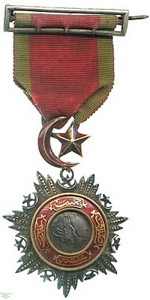
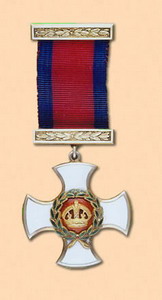
1 The Egyptian medal was not, I think, issued by the Egyptian Army but for service in Egypt. The picture (left) shown here is for an earlier time.
2 Instituted in 1852, the Order was awarded in five classes, with the First Class being the highest. The Order was issued in considerable numbers by Sultan Abd-ul-Mejid I as a reward for distinguished service to members of the British Army and others who came to the aid of the Turkish Empire.
3 The Distinguished Service Order (DSO) is a military decoration of the United Kingdom, and formerly of other Commonwealth countries, awarded for meritorious or distinguished service by officers of the armed forces during wartime, typically in actual combat. It was instituted on 6 September 1886 by Queen Victoria.
4 The citation read, "Henry Andrew Micklem, Lieutenant, Royal Engineers. In recognition of services during the recent operations in Egypt and the Sudan, including the Battle of Khartoum"
Possibly the most well-known fact about Khartoum is that of the death of General Gordon. The following is the start of the report of the battle by Lord Kitchener.
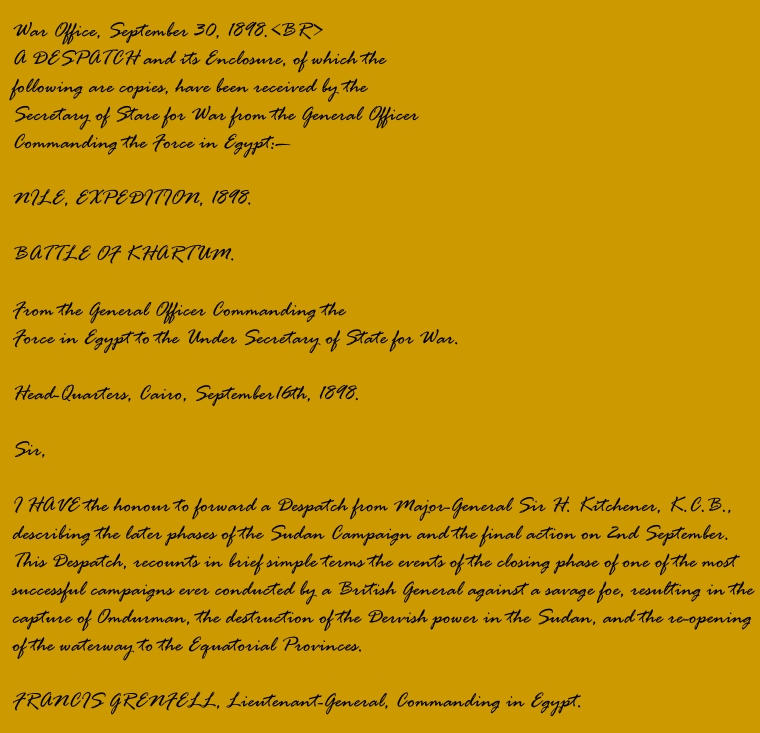
The report by Kitchener was several pages long and outside the scope of this document. The point of interest for me was that Micklems name appears in the list of wounded or killed.
Lieutenant H. A. Micklem, Royal Engineers, gunshot wound., toes, slight.
5 Brevet - temporary promotion in wartime, possibly later made permanent (as in this case).
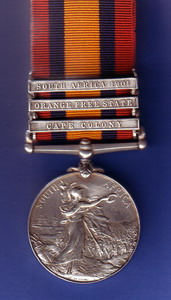
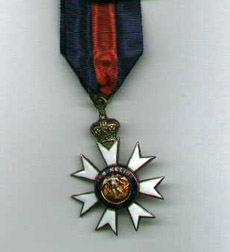
6These were campaign medals issued to Micklem for the Boer War. The King's medal was the same but with Green-White-Orange bands. The other side showed Queen Victoria.
9CMG means "Companion of the order of St Michael and St George"
7 Firstly there was the Imperial Military Railways created after the second Anglo-Boer war. It was established in 1900 under the supervision of Lieutenant-Colonel Sir Percy Girouard. In 1902 The Imperial Military Railways proceeded to assume control of all lines in the Transvaal and Orange River Colony, and it eventually became the Central South African Railways (CSAR), still under the control of Lieutenant-Colonel Sir Percy Girouard.
This information came from a nice potted history of early South African Railways, but unfortunately the page has now vanished.
There is a brief reference to Lt. Micklem in the history of the Royal Engineers where he is thanked by a Capt. W S Gordon (any relation?) for his advice on the Cape to Cairo line - which in fact was never finished.
8 The Chinese Engineering and Mining Company also had connections with famous people and events. Herbert Hoover, who was to become a US president was involved with the running of the company and its railways during the period of the Boxer Rebellion (1899 - 1901). The rebellion got its name from the newspaper shortening of the Chinese name The Society of Righteous, Harmonious Fists. In June 1900 the Boxer Rebellion caught the Hoovers in Tientsin. For almost a month the settlement was under heavy fire. While his wife worked in the hospitals, and wrote a diary, Hoover directed the building of barricades, and once risked his life rescuing Chinese children. In his campaign for presidency 1929 lawsuits regarding the company were used against him, but he was exonerated. For a good description of the rebellion and its aftermath, see the relevant Wikepedia entry.
Micklems involvement was after that of Hoover, from 1904. There is a very brief undated reference to his being a director of this company that formed in 1912 so it was probably re-formed at some stage. The company seems to have had a wide range of nationalities involved. I have seen reference to Chinese, Belgian, American and British interests and there may have been others.
Colonel Micklem is buried in Hurley Churchyard near Rosehill. My thanks to Nick Yarrow for the pictures.
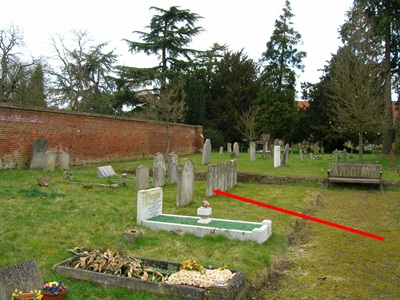
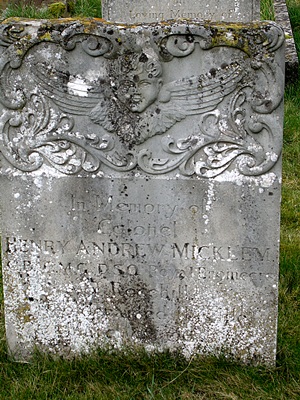
Update January 2013.
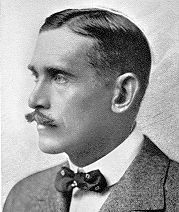
This month I have received some very interesting additional information from a gentleman who knew Colonel Micklem. His name is Stephen Pollock-Hill and the following information and Photograph is a collation of the information that he has supplied. I am most grateful for this. - DG.
Dear Don.
I knew Colonel Henry Micklem quite well, as my late father Malcolm Pollock-Hill was his secretary for many years, from the late Forties to about 1963.
My parents used to be invited to stay at Rose Hill and as a young man I visited 9 Green Street, Mayfair on many occasions between 1955 and 1963. These visits were mainly so that I could go out with my godmother, or to collect my father for dinner or a trip to the theatre or cinema, in the West End.
My late godmother Pan ( Pansy) Burchall, (a former actress and dancer), was Colonel Micklem's "companion", probably as near as he ever came to having a wife.
He rather adopted her after her husband died, She was a former girlfriend of my father in his bachelor days. I have a silver cigarette case signed "to Malcolm, love Pan 1930"
My father even considered buying the property 9 Green Street when the Colonel died, (it went for about £100k then!) the whole building!
I always visualise him in " white tie and tails" as even in the late Sixties he always "dressed for dinner", while his spotless white starched "westcot" always impressed me.
He was very tall, straight backed ( ex Army officer) with a strong stern but kindly face. He had white hair and a moustache rather walrus -like as I recall.
Even in the Fifties he lived an Edwardian life-style at Rose Hill, with a butler who unpacked guest suitcases, and two housemaids, and a cook, two full time gardeners plus assistants, and there was always fresh home grown produce from the kitchen garden served at meal time my parents said.
Rose Hill, was quite a place, not quite Downton Abbey, but the life was straight out of "The Forsythe Saga", if you know what I mean.
Here is an excerpt from the memoirs of my father, written between 1989 and 1992, when he had retired to Southern Spain.
Firstly I must give the background details of my new boss.
Colonel Henry Micklem CB. CMG. DSO was the son of General Micklem of Rosehill, Henley on Thames, the family home of many generations of Micklems. He was educated at Winchester, and Woolwich where the army educated him as an engineer.
After the Boer War, the army lent him to a company to construct a railway in South Africa. He was then seconded to the Chinese Engineering and Mining Company in Tientsin, China (now 4th largest city in China, and spelt Tianjin ) as general manager of the largest coal mining and engineering concern in the Far East. His predecessor in the job was Hubert Hoover, later to become President of the USA. This appointment ended when the Japanese invaded China and took control of the mines.
Henry Micklem returned to England to take up an important post in The War Office during the First World War and took over as Chairman or Director of several important public companies (see above) including The Investment Trust, and The Gaumont British Film Company (later the Rank organisation in 1941). These were companies that had been started by his father, as well as two Southern Spanish railways and Greenwood & Batley, a large engineering company in Leeds.
Henry Micklem was the finest man I ever met, he was 6ft 4ins tall, with bright blue eyes, complete integrity and fair and just in his judgements. I knew him intimately for over 40 years, and I never saw him do a mean or underhand action. I ended up being executor of his will.
My work for Henry Micklem was not connected with his various directorships as the companies had adequate staff to deal with any problems, but mainly with his personal affairs.
One of these was that his brother Edward Micklem had died and Henry was an executor and there were complicated legal problems which involved me dealing with top legal counsels.
His father was very old and had become senile and Henry was nominated as Receiver under Victoria Act 53 which involved the assets and properties of the General submitting accounts to the Official Receiver.
When both his mother and father died, Henry inherited the Rosehill estate and I had to go down there once a month to pay the staff, become an estate manager and familiarise myself with the tasks , leases with farmers and the sundry pubs and cottages management.
Country House life before the Second World War (with plenty of staff) was very pleasant. The Rosehill staff consisted of a butler, and footman, cook and kitchen maid, two house maids, a chauffeur , a head gardener and three under gardeners, and living in the Bothy, a game keeper, and assistant. I had to arrange for the payment of their wages, insurance stamps, and petty cash accounts. I must say it all worked very well.
Henry organised many shooting parties during the season but otherwise only went down to Rosehill at weekends. We dressed for dinner every night but that was no chore as one had a good hot bath, and the clothes were laid out by the butler.
It is a style of life that has gone for ever. Henry was comfortably off but not a multi millionaire. During the war staff was difficult to get but I remember Henry ringing up his brother in law General Sir Hebert Wilberforce, grandson of the Liberator* whom we both disliked and asking him for the weekend saying youll have to rough it Herbert as we have no footman!
In pre War days, it was not the expense of keeping a large staff that was important, but the quality of the employees that were prepared to devote their lives to domestic service without any feeling of inferiority.
There was a dignity in being a good butler, or a dedicated cook to an employee who knew the rules. For example at Rosehill there was a green baize door that divided the kitchen quarters and bedrooms and neither Henry or I invaded this privacy. You would ring the bell and ask for whoever you wanted to come and see you. There was no need to increase wages each year as there was no inflation to make life more expensive. The indoor staff were fed as cook decided, and the butler was responsible for discipline. The outdoor staff had their own cottages with whatever perks went with the job.
I had a pleasant office on the first floor where I held discussions with the senior members of staff. I enjoyed my talks with Stacey the head gardener whose knowledge, not only of gardening but of country life was immense.
Rosehill was a large Victorian house that had been built after the previous house had burnt down. It overlooked the lovely Thames Valley and there were no ugly developments to spoil the view as all the surrounding countryside had other large estates that had been owned by the same family for ages. As an example of this I came across a lease to a George Barefoot for one of the cottages dated 1690 let by a Henry Micklem, and 270 years later I was responsible for collecting the rent from a descendant George Barefoot on behalf of the current Henry Micklem!
It was a great sadness that as executor, I had to sell Rosehill as Henry had no children to inherit.
I sold it to Walter Gilbey of the gin family. I have never wanted to go back there again.
Kind regards,
Stephen Pollock-Hill.
*The Liberator was the name given to his grandfather William Wilberforce who abolished slavery.
Gilbey turned the area into an equestrian centre. Here is an excerpt from the centres home page DG.
Rosehill estate was purchased in the early 1960s by Mr & Mrs W A Gilbey and it has evolved in to an equestrian estate following their passion for horses.
Rosehill estate comprises of over 80 acres made up of old fashioned parkland, paddocks and woodland, with a wide variety of cross country jumps set in the woodland and in the open fields. We have jumps ranging from 16" up to 36" making this an ideal place for improving the skills of both horse and rider. The course is generally available 7 days a week, 12 months a year subject to ground conditions and events.
Footnote.
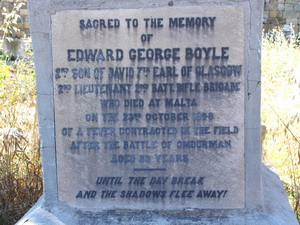
There is a curious link to another part of my web site Walking the old Malta railway Mention is made there of Ta Braxia Cemetery. There are many interesting and poignant gravestones, including this one. Lt Boyle is not mentioned in the list of casualties along with Micklem because he died later in Malta, but nevertheless a casualty he was. He is recorded in a memorial in Fairlie Church, Scotland.
©Copyright Don Gaunt
Click here to go to the Faydon.com Home Page